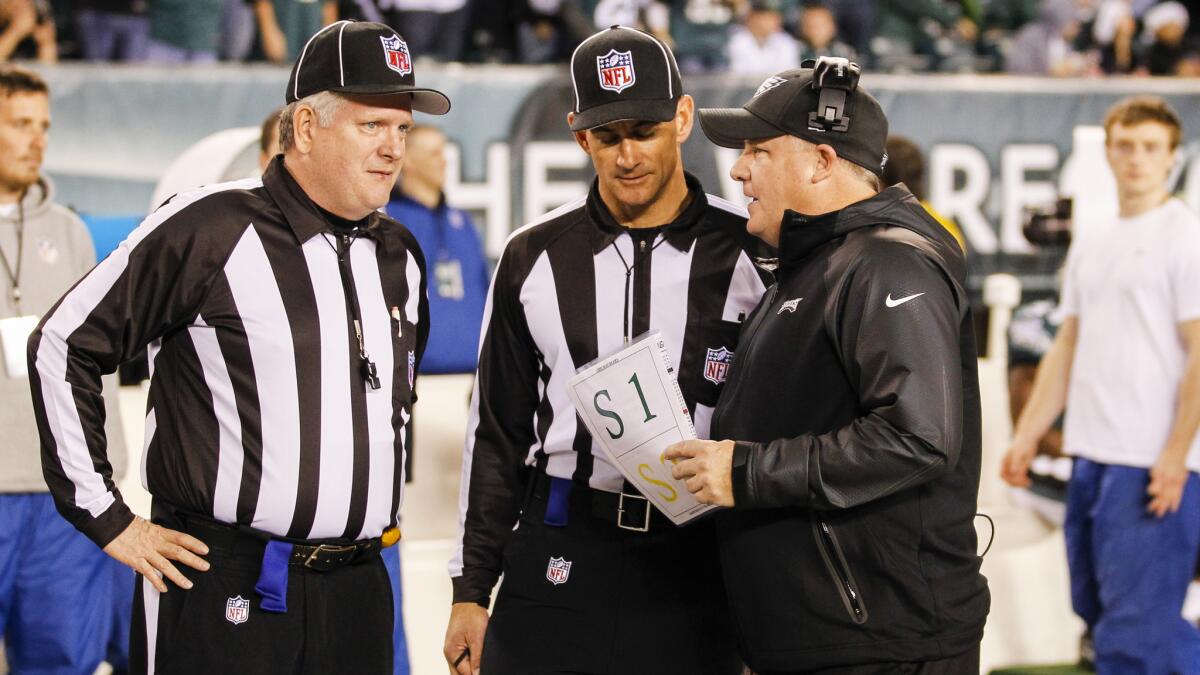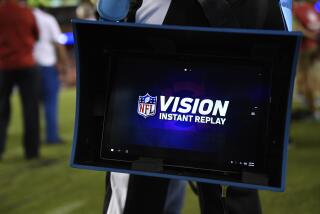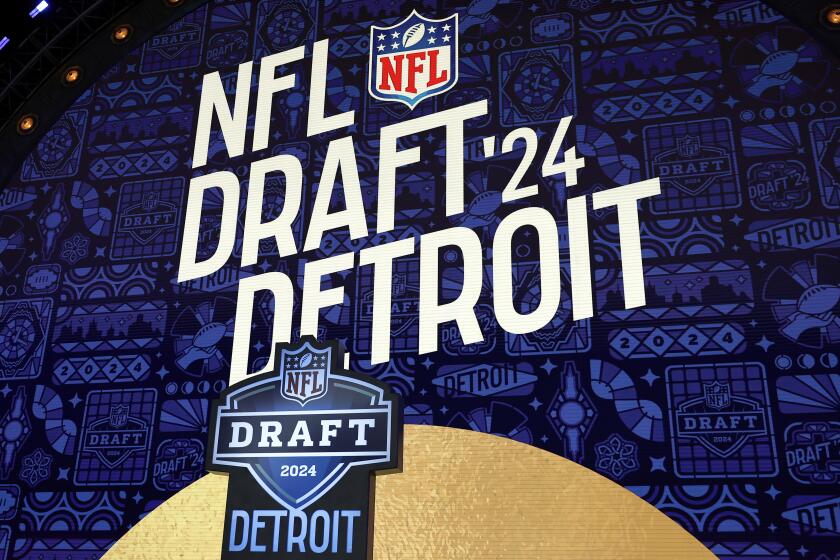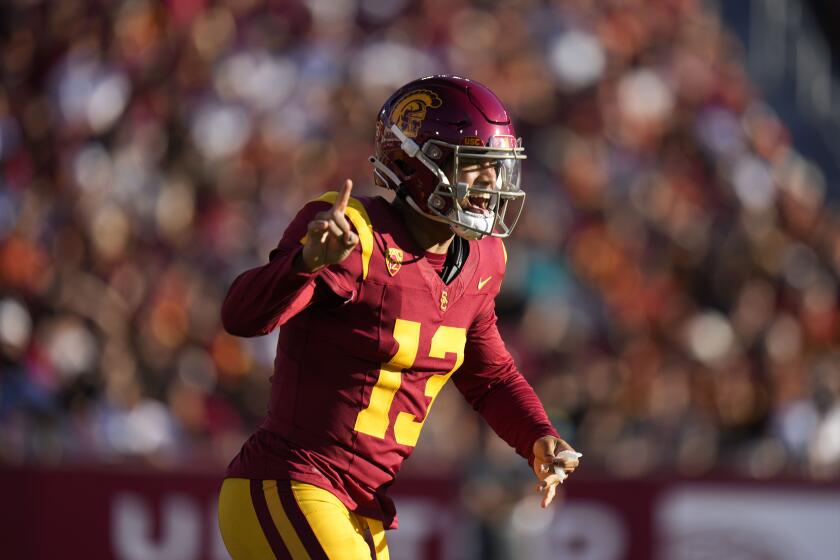It’s full speed ahead in the NFL as offenses shift into high gear

The Philadelphia Eagles have really got to hand it to the guys in stripes.
No, seriously. Coach Chip Kelly wants his players to hand the football to an official as soon as a play ends so the ball can be spotted immediately for the next snap. Spinning or spiking the ball in celebration, or even leaving it on the ground? That stuff is decidedly not for the Birds.
In Green Bay, the Packers have the “Drive for 75.” They want to average 75 offensive plays per game this season, eight more than they averaged last season and three more than the league-leading average of the Denver Broncos.
“The no-huddle is a beast,” Oakland Raiders cornerback Charles Woodson told reporters recently. “It keeps a defense on its heels.”
In that case — with apologies to Seahawks running back Marshawn Lynch — every NFL franchise is in beast mode this season. It seems every team is determined to stand on the accelerator more frequently, pushing their offense (and scurrying officials) to the limits.
It’s worth noting that while every hurry-up is a no-huddle, not every no-huddle is a hurry-up. For instance, Denver quarterback Peyton Manning might use every second of the play clock when running his no-huddle, making adjustments at the line of scrimmage to get a defense to tip its hand. As its name suggests, the objective of the hurry-up is to run plays in quick succession.
The Packers and Seahawks could be in fast-forward quite a bit Thursday night when they kick off the NFL season at CenturyLink Field, with both offenses adept at shifting into high gear.
The emphasis on speed hasn’t just put a premium on the endurance of players. The NFL demands that its on-field officials meet the challenge, and they are given extensive fitness tests to make sure they aren’t a drag on the frenetic pace of a game.
In July, the Wall Street Journal reported NFL referees participated in a fitness clinic in Dallas in which they were tested for all types of “functional movements,” including flexibility and speed.
“We’re trying to help them and we feel that’s going to translate into better officiating. Better movement, better officiating,” Dean Blandino, the league’s vice president of officiating, told WSJ.com. “If it helps us officiate more plays [in the no-huddle], that’s a good thing.”
For the TV broadcast team, that demands the ability to nimbly adjust on the fly. In last season’s Kickoff Opener, when Denver played host to Baltimore, the NBC crew was ready in case Manning upshifted to turbo mode.
“What [producer] Fred Gaudelli came up with was, don’t even try to jam a replay in,” play-by-play announcer Al Michaels said. “We decided what we would do at the first opportunity, whether it was a penalty or a 60-yard incomplete pass where guys would have to come back to the huddle, we would do a package of replays. As long as they were going to go at warp speed, we were going to stay in the game and go no place else, because it would be too unwieldy and too confusing to the viewer.”
As it happened, Denver didn’t run its fastest-speed offense and instead relied on its basic offense, so the network didn’t need to show clusters of replays in packages. But with Green Bay threatening to step on the accelerator, the broadcasting contingency plan is back in place for Thursday’s game.
Michaels thinks the Packers could be sounding a false alarm, particularly with the challenge of communicating in a deafening environment.
“Every year you hear teams are going to run the fastest hurry-up, et cetera, but I think that’s a little bit of a smokescreen,” he said. “It’s one thing to say you’re going to run a play every 12 seconds, but it’s another thing to actually do it. You tell me if Green Bay’s going to be able to run that offense in that stadium as a visiting team.”
Kelly thinks people frequently read too much into a high play count.
“I don’t think plays-run and playing fast are correlations,” Kelly said. “I’ve never said that. I’ve seen teams run 90 plays in college and score seven points.
“I’ve never been a plays-run guy. I think that’s an overblown thing. I’ve always kind of chuckled inside at this whole deal of he wants to run a ton of plays. I’ve never wanted to run a ton of plays. All I’ve ever wanted to do is score a ton of points. If we can score them in one play, that’s awesome. If we can score them in 14-play drive, that’s awesome too.”
One of the main objectives is to string plays together in staccato fashion so that a defense doesn’t have time to rotate in fresh players, or players who are better suited for, say, passing situations. As long as the offense isn’t substituting players, it’s not required to wait for the defense to do so.
The Pittsburgh Steelers aren’t going to put a Chip Kelly-style offense in place, but they might look a little closer to their cross-state counterparts this season with a more up-tempo offense.
Todd Haley, Steelers offensive coordinator, has resorted to the hurry-up throughout his career. When he was head coach in Kansas City in 2009, and his Chiefs were overmatched against the Steelers, Haley used a fast-paced offense to keep the Pittsburgh defense on its heels.
“We came up with a package on all second downs,” Haley recalled by phone. “As soon as second down ended, we went right to the line and had a package of plays we could run out of whatever personnel group we were in, to keep [Steelers defensive coordinator] Dick LeBeau from getting to his third-down calls. If you did it fast enough, he couldn’t get to them, so you got a much more vanilla look.”
The Chiefs had several huge plays on third down in that game, including two touchdowns in regulation and a 61-yard catch and carry in overtime that set up the winning field goal in a 27-24 victory. It was one of just four games Kansas City won that season.
Although more teams are using it more frequently, the hurry-up offense is nothing new. Jim Kelly guided the Buffalo Bills to four consecutive Super Bowls in the early 1990s behind the breathtaking tempo of their mach-speed scheme, nicknamed the K-Gun. That system was so relentlessly fast, it could have opposing defenses begging for mercy.
“Ask Howie Long about that,” Kelly told The Times in 2012, referring to the legendary Raiders defensive lineman. “I remember we played them in the AFC championship game [in 1991] and he yelled at me. He was like, ‘Come on, Kelly! Slow this down, man! Slow it down!’ I just started laughing.”
These days, as teams tear off plays at an increasingly fast pace, there might be some laughing. But there’s far more gasping.
More to Read
Get our high school sports newsletter
Prep Rally is devoted to the SoCal high school sports experience, bringing you scores, stories and a behind-the-scenes look at what makes prep sports so popular.
You may occasionally receive promotional content from the Los Angeles Times.







